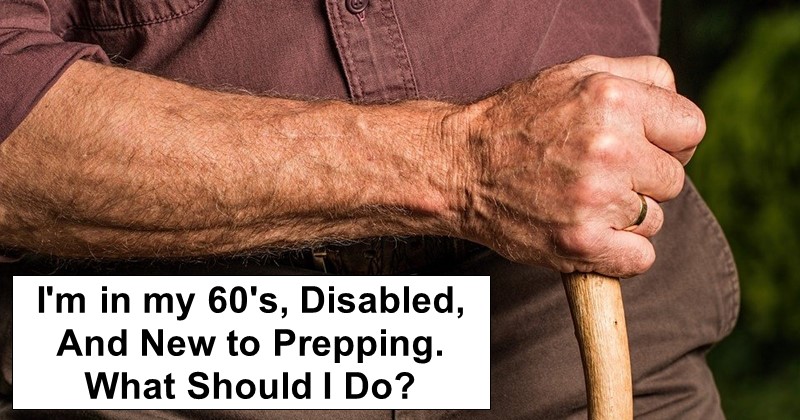I got this email the other day from one of my readers asking my advice about what he can do to get better prepared since they’re getting older and have some health problems. As always, I answered and I figured my answer may help others, so I’m posting it here. FYI, I was given permission by the reader to repost my response here, which I appreciate very much. I hope it helps.
His Question
“My wife and I are both in our 60’s and disabled. Therefore, we are most likely going to stay put during an emergency situation (unless we’re forced to leave). We live in town in a subdivision. What reasonable steps (practical and financial) can we take to increase our likelihood of survival during an emergency? We are just beginning to be preppers.”
My Answer
Thank you for reaching out. Most new preppers–no matter their age–tend to want to “do it all” because they feel they have to. It’s great to have that enthusiasm but this isn’t a race, it’s more like a marathon.
So, my first suggestion would be to prioritize. Think about what it is you’re most lacking or most reliant upon and ensure you have that taken care of as best as you can. For example, most of us understand we need to stockpile food for emergencies, but what about prescription medications or food for your pets? Most folks also don’t realize how important water is to their daily lives, so be sure to have a plan to store water and procure more. I could go on and on about everything else you could/should stockpile (e.g. personal hygiene supplies, fuel, money, etc.) but there are plenty of lists on the internet which cover that. Here’s one such list just to give you an idea: https://urbansurvivalsite.com/100-items-to-disappear-first-in-a-panic/.
Note: I wouldn’t bother trying to purchase everything on that list whatsoever because there are inevitably items on it which won’t be immediately useful to you as a beginner; things like a grain grinder and canning supplies are what I’m talking about. Eventually they can be useful, but usually not when you’re just starting out.
While I’m thinking about it, I wouldn’t ignore being able to evacuate (preppers call it “bugging out”) during an emergency. Even if your plan is to stay put in most cases, which is understandable, you back yourself into a corner if you’re unable or unwilling to evacuate. Besides, there are some disasters where evacuation is the first and best plan of action such as if you live in a hurricane flood zone, for instance. Thus, my second suggestion would be to still have a plan to evacuate whether you want one or not. If your disabilities or major health concerns truly preclude you from evacuating on your own then it behooves you to reach out to your local officials so they’re aware of your needs and so that they can plan to help you during an emergency situation.
This leads me to my third suggestion: since your plan is to stay put if at all possible AND I assume you’re limited in your physical abilities then I strongly encourage you to find people who you can rely upon during an emergency. This could be nearby family and friends who come to stay with you (or you with them) or it could be your neighbors. It doesn’t much matter who, so long as they’re reliable and trustworthy. These people would do the legwork of survival, such as gathering water or firewood, cleaning dishes, or whatever it is you cannot do yourself in exchange for something you provide, like food or a roof over their head.
Of course there are many other factors which will make a difference in how you choose to prepare, like where you live or how long you’re trying to prepare for, but the basics of survival aren’t all that difficult to figure out if you simply stop to think about it. You can do more than you realize and you’re already taking the best first steps by asking the right questions. Just keep at it and you’ll be better prepared than you realize soon enough.
I realize too that you asked about reasonable financial steps to take which I failed to answer initially. From a preparedness standpoint, and assuming that you’re on a budget (who isn’t these days), I can say that you should focus your efforts on purchasing more of what you know you’ll use in the future. This would be all of the obvious supplies you already consume (food, medicines, toiletries) and not so much on preparedness-specific items like generators and grain grinders. These preparedness-specific items can prove useful down the road, but to start with they shouldn’t be your focus. Perhaps the only exception I can think of right now is your ability to store, treat, and collect water since it’s so vitally important to life and daily living. Once you feel like you have plenty of the items you know you’ll use then you can focus on the preparedness items.
Also, I would strongly consider money-saving strategies like buying in bulk, shopping at wholesale centers (e.g., COSTCO), purchasing food and other items when on sale (like buy one get one sales), and clipping coupons for stuff you already consume. Sometimes local co-ops can be a good option for buying quality food in quantity while also saving money. A little effort in these areas can go a long way to saving money AND getting you better prepared.
And, of course, there are plenty of DIY ideas for preparedness that may be of interest, everything from making your own fire-starters to makeshift water filters if you really need to do this inexpensively. And while YouTube would be the best source to find so much out there, I keep a ton of videos on my website as well as links to a bunch of “how to” survival topics and a lot more if you’re interested.

Leave a Reply